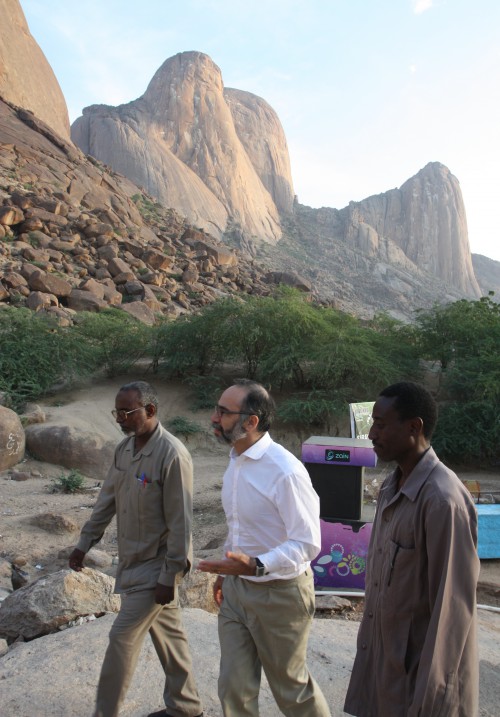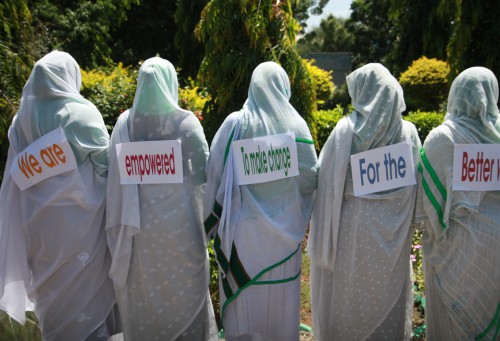10th October 2013
Travels in the East
I have just spent a couple of days in Kassala and Gadarif. I know that some people think it is strange for Ambassadors to make visits outside the capital. Of course most of my business is with the Government in Khartoum. But I am the ambassador to Sudan, not to Khartoum. It’s important not to neglect the regions outside the capital and the only way really to understand a country is to visit it.

To do that I try to meet as wide a range of people as possible: Governors, local Ministers and officials, business, academics, media, civil society. On this visit I was stopped from meeting local members of national Parties, including the DUP who are of course part of Government.
Perhaps there was a particular incentive to leave Khartoum after recent events there. The day before I drove to Kassala two senior officials from the UK visited Khartoum. In their meetings with Government representatives they made clear the shock which we, and many Sudanese, feel at the use of disproportionate force against protestors. They reiterated the call in the statement by the Minister for Africa for the authorities to stop immediately the use of live ammunition, for basic civic rights of freedom of expression, assembly and protest to be respected and for progress on a genuine national dialogue.
I referred to our statement when I met the Governor of Kassala. In the main we talked with him, and his counterpart in Gadarif about the challenges the local Government faces and the steps it is taking to address them.

The East of Sudan has some of the lowest development indices in the country. Quite why this is is not entirely clear. In discussions with development partners explanations ranged from cultural factors to geography. Natural resources are clearly a factor, particularly access to water. Kassala’s well-known horticulture is suffering from irregular rains. We are helping to address the water issue. We are at the final stages of design and procurement of a £20 million water project to ensure the provision of reliable and safe water services to rural communities.
I raised with the Governor of Kassala some of the difficulties UK and other International NGOs have had in the past working in East Sudan; travel permits, access and the like. One British NGO doing valuable work was forced to withdraw. These are not always local issues. Still the Governor has set up a new coordination committee to try to ease relations between the donor community and the local authorities. That should be helpful.
Another factor is refugees. There are some 90,000 in Kassala, many of whom have been there for decades. They face many challenges in securing livelihoods, and there are concerning reports of some falling prey to human trafficking. The UN and local government are trying to address these issues.
I visited a camp where the local government and UN agencies are clearly working very closely together to give residents of the camps and host communities the skills they need to end dependency and earn their own livelihoods. This includes vocational training and apprenticeships in areas as varied as food processing, mobile phone repairs and vehicle mechanics. In support of this the local government has very sensibly and imaginatively agreed to issue work permits to 30,000 refugees.
There is plenty of local initiative. Both Governors and their officials outlined some of the schemes they have to aid the most disadvantaged, ranging from direct financial support to the provision of micro-finance for small enterprise. I visited the community colleges of the Universities which are doing great work providing training and some basic health and education services to women in remote communities and helping them to generate income throughout the production and sale of artisanal products. I hope that we will be able to support some of this activity. We came away with some lovely gifts.

I spent quite a bit of time with the universities. Both Vice-Chancellors were very generous with their time. They are rightly ambitious for their universities. We discussed the scope for partnerships with UK universities, which we will certainly pursue. They showed me the facilities for English language tuition and I spoke with some very articulate students and faculty members in English. I took the opportunity to encourage applications for Chevening scholarships for postgraduate study in the UK.
I found the meetings with the students and faculty uplifting; a welcome antidote for what had been a quite depressing previous week. I came away more convinced than ever of the value of visits around Sudan. And they’re great fun too!
Dear Dr. Peter:
I’m really highly appreciated your visit to Kassla and Gadarif States. To be concerned about the regions outside the capital, it is actually a valuable effort. YOU are a good example to all the ambassadors in Khartoum and YOU should be pursued. Many thanks your Excellency Dr. Peter
We as Sudanese…appreciate your visit to East Sudsn…one of the less developed areas in the country..by this visit you break the high tower of diplomatic missions…we appreciate your visit to the educational institutions. ..Further we look forward to see development projects such as agricultural equipments….hospitals…women vocational training centers….
Looking forward seeing you visiting River Nile State and North Sudan.
Samia El Hashmi
Advocate
I am very impressed by His Excellency’s initiative to visit Sudan’s different cities and towns and to meet with different sectors of the Sudanese society. I believe such an initiative tends to bridge the rifts between the West and Africa, break down barriers and avail a brilliant opportunity to recognize the cultural treasures of Sudan.
It is always refreshing to read non-bureaurcratic comments like yours ,Yr Excellency.I hope some of our students apply for and get Chevening Postgraduate scholarships.As a former British Council scholar I know from experience that they will benefit from the academic as well as the other socio-political aspects.The £20 M water project demonstrates goodwill and desire to offer concrete help.We appreciate that very much.Recent ODI events have highlighted other British projects that are commendable.The riots were depressing ;but I expected you to mention the looting and destruction and ransacking of private as well as public property.Britain was shocked when looting took place in London and other cities 2 years ago .Freedom of expression faces challenges in many places as the Snowden case shows .Sensitive documents were destroyed in the basement of the Guardian as its editor has written.
As far as refugees are concerned the BBCs Mike Thompson was even-handed when he recorded for Radio 4 the success of our police in combating trafficking.
This is the positive diplomacy, it’s works to develop relation among the nation through like those valuable visits, which open the way to build strong relation in all fields, we hope all diplomatist follow the method of Ambassador Dr. Peter Tibber in order to understand the countries which their countries appointed them to facilitate and build strong relation with both their citizen and government. I am really like the way Dr. Peter Tibber follow to understand Sudan, His Excellency Ambassador Dr. Peter Tibber his article “Travels in the East” really show that he is a philosopher and this is appear from his following speech ” I am the ambassador to Sudan, not to Khartoum. It’s important not to neglect the regions outside the capital and the only way really to understand a country is to visit it. “
Dear Dr. Tibber,
Iam pleased that you are visiting various parts of Sudan to get to know the real magnitude of this incredibly beautiful country. As you are well aware that Sudan is a very reach country. It is also one of the poorest countries. This amazing dichotomy informs into the persistent challenges that Sudan is facing.
It is indeed my hope that UK develops a more focused approach in building communities from the inside-out. Perhaps the two main areas in this regard is the development of managerial leadership programs & vocational training that leads to real jobs in the market place,
Additionally, Iam pleased to see that you are already engaged in the water project that will enhance the healthy & stable communities.
Best wishes & Regards
Mamoun Gamal
Managing Director
Citypharm Pharmaceutical Industry
Khartoum North
Sudan
I agree with HMA’s messages that Education, basic services and more support to production at individual, community and the two states’ levels are some of the more prioritized and urgent needs.
I believe HMA’s visit avails much needed support at such difficult times and will prove instrumental particularly when DFID and its umbrella NGOs advocate with key bodies in the Government to facilitate more of their much needed services into these areas. I figure people there deserve to see some light at the end of the tunnel.
I also feel that if the underlying causes the HMA hinted to in his 4th paragraph are not readily known, there may be need to conduct research so as to reveal more of the root causes of the prevailing deplorable conditions in the East. Addressing them will of course necessitate opening the areas for further national, regional and international assistance.
your Excellency Dr/Peter tibber
i think its quite good idea to visit remote area from Sudan to explore it , and i think your last visit accomplish that hoping for more visit to other areas , the article showing the interest of UK for development in Sudan hoping for UK contrition in that .
yours
E/alaa E.Atabani
Dear your excellency Peter Tibber I am very glad that Kassala state is honored by your historical visit, I wish if I were there among the people who welcomed you. As you mentioned kassala needs hard work to be developed ,the Government of the UK is doing its best in this field, I am one of the people who are very lucky been offered chevening scholarship,its so kind of you encouraging the university students to apply for chevening. I think all partners particularly the line ministries and the governmental representatives need to be open minded to push development forward by providing essay accessibilities for international aids to Kassala state.
Mr Ambassador Peter Tibber welcome
I invite you to visit my city TOKAR in red sea province to see the level of destroyed which happened to this city , in the past this city was very important to BRITAIN because they were plant a cotton and they exported it to Churchill gins to produce clothes , you can return back to know about this city in the archive of colonies of Britain , finally accept my greeting and thanks
abdalla